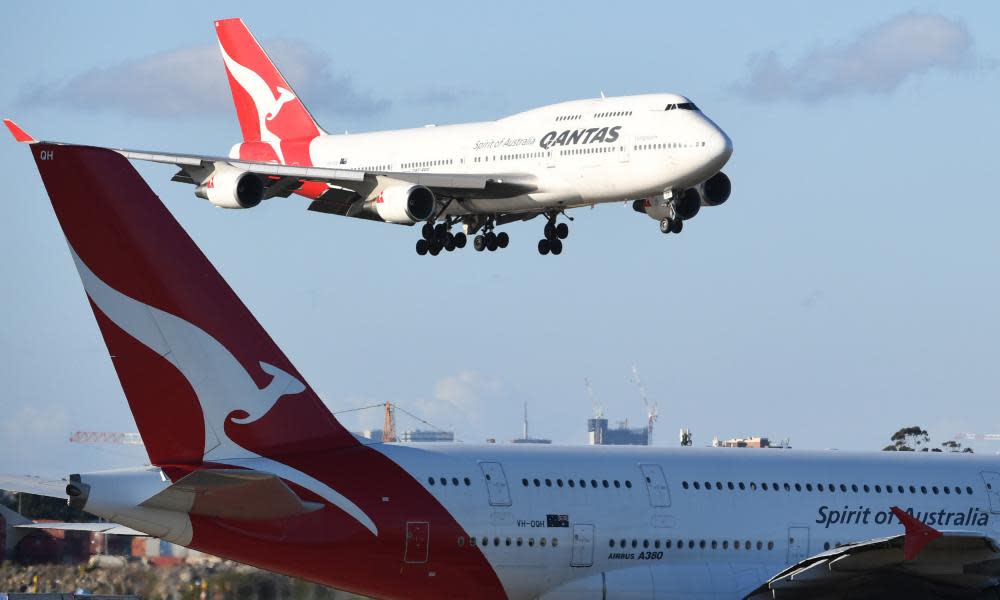Qantas 'women of influence' protest against airline's role in forced deportations

Nine finalists for an annual women of influence award that is sponsored by Qantas, including the former Human Rights Commission president Gillian Triggs, have written a letter of protest to the airline asking it to stop deporting asylum seekers.
The nine women were all chosen by the Australian Financial Review for its 100 Women of Influence awards either this year or previously. A black-tie dinner gala honouring the women was set for Wednesday night at Sydney Town Hall.
The list of signatories includes two who were nominated for their work in refugee advocacy: Tanya Jackson-Vaughan, the executive director of the Refugee Advice and Casework Service (Racs), and Shukufa Tahiri, the policy officer for the Refugee Council of Australia.
Racs has previously criticised Australia’s deportation policy as flawed, saying it found an increase in wrongful deportations that did not properly assess refugee’s claims.
Letter coordinator Anna Hush said this revealed the airline’s “hypocrisy” in celebrating the nominees’ work while continuing to allow its aircraft to be be used to deport asylum seekers.
“They can’t have it both ways,” she said. “Australia’s processes for processing refugees don’t line up to international standards and don’t reflect the responsibility Australia has under international law to provide safe pathways.
“What made us think of writing this letter is the stance Qantas took during the marriage equality debate. Qantas joined with the community to demand social justice from the government. That shows they are capable of it, and are capable of listening to the community’s demands.”
Internationally, many other airlines have refused to deport refugees or immigrants.
In the UK, Virgin Atlantic said it would no longer deport immigrants after many removals were found to be wrongful as part of the Windrush scandal. In the US, United and American airlines have refused to carry immigrant children separated from their parents under the Trump government’s new policies.
Pilots for Germany’s Lufthansa have also refused to deport asylum seekers to dangerous conditions – government figures showed 222 deportations failed last year due to pilots refusing to take off.
Hush said Qantas should “stand up” and refuse to be complicit in removals.
“Returning them to danger violates the international principle of non-refoulement, which states that countries have a responsibility to not return asylum seekers to danger,” she said.
“Qantas cannot celebrate us ‘trailblazing women’ while it continues to be involved in the deportation of women who have risked everything to move themselves – and often their families – to safety.
“While questions remain over the Australian government’s process for assessing people’s claims for asylum, Qantas should not facilitate any forced removals or transfers.”
Other signatories include Dr Nicky Ringland from the University of Sydney; Prof Miranda Stewart from the University of Melbourne Law School; Prof Juliet Willetts from the University of Technology Sydney; and Nina Funnell, a director of End Rape on Campus, where Hush is also a director.
Eight signatories are among the 100 “women of influence” finalists this year for awards, while Triggs was nominated previously.
A Qantas spokesman said it was “disappointing” that “a small number of protesters are trying to take the focus away from celebrating the achievements of these outstanding women”.
“We appreciate that [deportations] are a sensitive issue. The government and courts are best placed to make decisions on complex immigration matters, not airlines.”
In August, advocacy group the Australasian Centre for Corporate Responsibility met with Qantas to raise the same concern, presenting a statement signed by more than 60 representatives of business, unions, human rights organisations.
Virgin Australia also transports asylum seekers on behalf of the government.

 Yahoo News
Yahoo News 
